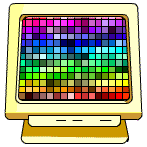Net News 04.08.00
Created | Updated Jun 21, 2003

Nanotechnology Promises Big Changes by Getting Small
Comedian Steve Martin used to have a bit where he'd say "Let's get small". Today he'd probably say "Let's get nano".
Thanks to hyperadvances in nanotechnology, getting small is starting to mean big business.
Nanotechnology is the science of molecule-sized devices. That's right -- computers and machines small enough to, for instance, float around in your bloodstream. Nanotechnology is still a ways off, but it is already revolutionizing our ideas of computing and medicine.
What Is Nano?
A nanometer is one billionth of a meter. That's one thousand, million times smaller than a meter -- perfect for measuring very, very tiny things, such as molecules. According to Nanozine.com, 3 to 4 atoms side by side would measure about a nanometer.
The trick to nanotechnology is building small machines that can grab and rearrange individual atoms. Once you can do that, you can theoretically reproduce anything, any time, in as many quantities as you'd like. And once you create a machine that can replicate itself -- the possibilities are endless.
Nanocomputing
The future includes shrinking PC components to the atomic level. This miniaturization would create mammoth jumps in both power and memory. A supercomputer could be the size of a drop of water.
Nanomedicine
In the future, surgery won't mean going to the doctor for an invasive procedure. Instead, you'll swallow a pill holding thousands of nanobots. These bots will scour your body destroying offending cells.
The implications for nanomedicine are so great that it could even alter the way we age. Nanobots could look for old cells and repair them -- building new ones from the atom up.
Nanofood Supplies
If nanotechnology succeeds in putting an end to aging, then pollution, hunger and disease would be rampant. Although nanotechnology could lead to those problems, it could alleviate them too.
Nanotechnology could clean up toxic waste on the atomic level. Breaking down hazardous materials into innocuous parts. It could even synthesize food on the molecular level, helping prevent starvation and famine.
Of course, these developments are still decades away. Numerous advances must occur before nanotechnology becomes commercially viable. Followed by years of human trials.
But if you were to ask me which aspect of the future is the most exciting, with the most potential to change our lives, then I'd quote Steve Martin: "Let's get small."
